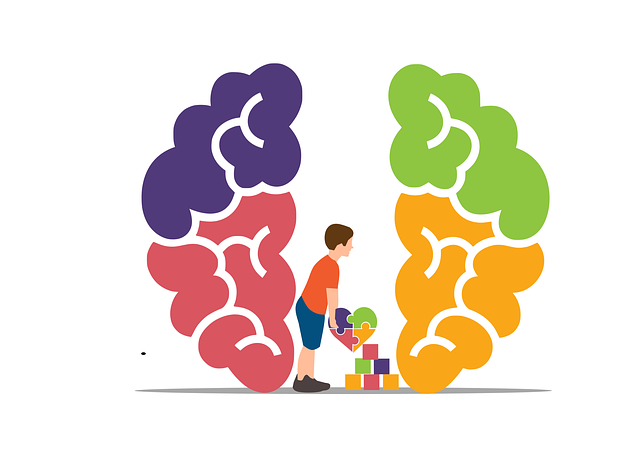Evaluating Greenwood Village Gambling Therapy requires a multi-faceted approach combining structured interviews, surveys, and tracking participant progress before, during, and after the program. Quantitative metrics like PGSI and DASS measure gambling behavior and emotional well-being, while qualitative methods such as Mental Wellness Journaling Exercises provide deep insights into personal growth. This blended approach ensures comprehensive evaluation, enhancing mental wellness support within the community. Long-term tracking of participant progress is vital to gauge sustained positive changes, with cultural sensitivity and therapist burnout prevention ensuring high-quality care over time.
Evaluating mental wellness programs is paramount, especially those offering specialized treatments like Greenwood Village Gambling Therapy. This article delves into three crucial aspects of program evaluation: Assessing Impact using specific methods and metrics; leveraging Participant Feedback for refining treatment effectiveness; and ensuring Long-term Sustainability to measure success beyond initial therapy phases. By exploring these key areas, we gain insights into the holistic improvement achieved through programs like Greenwood Village Gambling Therapy.
- Assessing Program Impact: Methods and Metrics for Greenwood Village Gambling Therapy
- Participant Feedback: Voice and Perspective in Evaluating Effective Treatment
- Long-term Sustainability: Measuring Success Beyond the Initial Phase of Gambling Therapy
Assessing Program Impact: Methods and Metrics for Greenwood Village Gambling Therapy

Evaluating the impact of Greenwood Village Gambling Therapy requires a multifaceted approach to assess its effectiveness in enhancing mental wellness. One crucial method involves tracking participant progress through structured interviews and surveys before, during, and after the program. These assessments capture changes in gambling behavior, mental health symptoms, and overall quality of life. For instance, measures like the Problem Gaming Severity Index (PGSI) can quantify gambling-related issues, while scales like the Depression Anxiety Stress Scales (DASS) evaluate emotional well-being.
Complementing quantitative metrics, qualitative data from Mental Wellness Journaling Exercises and feedback sessions offer profound insights. Participants’ reflective writings and open discussions facilitate a deeper understanding of their personal growth, coping skills development, and the program’s influence on their lives. This combined approach—blending quantitative and qualitative techniques—ensures a comprehensive evaluation of Greenwood Village Gambling Therapy’s impact, providing valuable guidance for improving mental wellness support within the community.
Participant Feedback: Voice and Perspective in Evaluating Effective Treatment

In any evaluation of mental wellness programs, particularly those offering innovative treatments like Greenwood Village Gambling Therapy, participant feedback is invaluable. The perspectives and voices of individuals who have directly experienced the program provide a nuanced understanding of its effectiveness. This qualitative data offers insights into how participants perceive their journey, identifying key aspects that contributed to positive outcomes or areas for improvement. By encouraging open dialogue, programs can gain valuable insights from those they serve, ensuring interventions remain relevant and aligned with individual needs.
Self-Awareness Exercises and Positive Thinking are often integral components of mental wellness programs. Participant feedback can highlight the impact these techniques have on fostering self-reflection and optimistic attitudes. This qualitative analysis complements quantitative metrics, offering a comprehensive Mental Health Policy Analysis and Advocacy perspective. Through listening to participants’ voices, programs can enhance their practices, ultimately improving outcomes and promoting holistic mental health.
Long-term Sustainability: Measuring Success Beyond the Initial Phase of Gambling Therapy

After the initial phase of Greenwood Village Gambling Therapy, assessing long-term sustainability is crucial to determine the program’s overall success and impact on individuals’ lives. This involves tracking participants’ progress over an extended period to ensure that the positive changes gained through therapy are maintained. Measuring long-term outcomes can provide valuable insights into the effectiveness of gambling therapy and help identify areas for improvement in mental wellness coaching programs development. For example, assessing whether participants have reduced gambling-related behaviors, improved coping strategies, and sustained mental health benefits six months or a year after treatment is key to understanding the program’s longevity.
Cultural sensitivity in mental healthcare practice plays a significant role in this evaluation process. Recognizing and accounting for cultural differences can ensure that the therapy remains effective and accessible across diverse populations. Additionally, preventing burnout among therapists is essential to maintaining high-quality care over time. Regular monitoring of therapist well-being and providing support through tailored training and resources can contribute to the overall success and sustainability of the mental wellness program, creating a healthier environment for both practitioners and participants alike.
Evaluating mental wellness programs, such as Greenwood Village Gambling Therapy, requires a multi-faceted approach. By combining methods like assessing program impact through specific metrics, incorporating participant feedback for diverse perspectives, and examining long-term sustainability, we can gain a holistic understanding of effectiveness. These strategies ensure that the benefits of therapy extend far beyond the initial phase, fostering ongoing recovery and improved mental wellness for participants.














